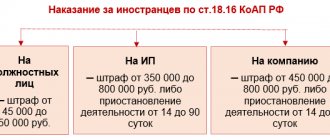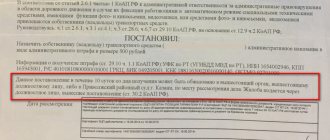The execution of a court decision begins from the moment it enters into legal force, after the plaintiff files an administrative claim. Moreover, since administrative cases are directly related to the violation of the rights of individuals and legal entities due to the exercise of authority, in most cases it is necessary to apply for the execution of a court decision immediately. Based on this fact, the Code of Administrative Procedure of the Russian Federation provides for shortened deadlines for appealing in some cases, so the deadlines should be monitored especially carefully. Court decisions in administrative cases are appealed in three stages:
- appeal;
- cassation appeal;
- appealing a decision by way of supervision.
Let's look at each stage of the appeal in more detail.
Tip 3: Keep your complaints to the point.
It makes sense to file a complaint only when you are really able to prove that you did not violate the rules. Let’s say a shadow from a car fell on a dedicated lane, the camera counted it, and the inspector, without looking, issued you a resolution under Part 1.1 of Art. 12.17 Code of Administrative Offenses of the Russian Federation. In each specific case there will be nuances that you can cling to, but the principle is the same for everyone.
“You need to clearly formulate what exactly your disagreement is,” says Sergei Radko. “Many people say: I received a fine for speeding, it says: “I was driving 85 km/h,” but I remember exactly, the speedometer showed 79 km/h! The position: “I didn’t violate because I couldn’t violate” is not serious, more weighty arguments are needed.”
Time limit for challenging the protocol on bringing to administrative responsibility
The term for challenging the protocol on the case is 10 days.
This period begins to be calculated at the moment of delivery or receipt of a copy of the protocol.
In addition, the missed deadline for appeal can be restored. To do this, in a complaint against the decision it is necessary to request the restoration of the deadline and indicate the reasons for missing it.
As a rule, the reasons should be assessed as valid - illness, being abroad, etc.
IMPORTANT : the term is restored by the court or official who will consider the complaint.
Tip 4. Appeal the fine through the district court
Of course, nothing prevents you from filing a complaint with the organization that issued the fine. There are several such structures in Moscow. If you do not agree with the fine for parking under the signs “No Stopping”, “No Parking” or for parking on the lawn, you need to contact the Moscow Administrative Road Inspectorate (MADI). If you are charged with non-payment of parking, go to the State Public Institution “Administrator of the Moscow Parking Space” (GKU AMPP). Other fines can be appealed to the department of the State Traffic Inspectorate that issued the resolution. This can be done in person or by mail.
How to register your disagreement with the protocol on the spot?
A protocol on an administrative offense is drawn up in the presence of the person. This requirement is mandatory.
There is no point in refusing an official to sign a puncture. Refusal to sign the puncture will lead to unnecessary manipulations by the official to formalize the refusal to sign the puncture. Therefore, such a refusal is unnecessary and inappropriate.
It is necessary to formalize disagreement in the protocol by filling out the column “Explanations and comments on the contents of the protocol.” At the same time, “disagree” is not a sufficiently informative entry. It is necessary to briefly indicate the absence of an offense (“I did not smoke in the entrance”), or disagreement with the contents of the protocol (“I do not agree, there is no sign, the markings are erased”).
Such a record may force an official or an authorized person to make a decision on the case, taking into account the specified circumstances. However, if the person against whom the case is being conducted does not provide evidence, the circumstances specified in the protocol may not be taken into account. They can put up a sign and draw a line. Therefore, it is necessary to take care of collecting evidence at the site of the puncture.
The protocol, in essence, is documentation of the circumstances of the violation committed, on the basis of which a case is initiated. However, some officials have the right to draw up a resolution on the case of an administrative violation immediately after drawing up the report. Disagreement with the protocol, expressed in any way, does not affect the official’s conclusions about the presence or absence of guilt in the violation.
How to file a complaint against a protocol on an administrative violation?
The complaint must indicate the addressee - the court or official to whom the complaint was sent. The text indicates the number of the decision being appealed. It is necessary to indicate the reasons for the illegality of the decision on an administrative offense:
- The protocol was drawn up incorrectly, some circumstances were not taken into account
- The person against whom the case was considered was not properly notified of the time and place of the hearing.
- There was no offense event
- There is no corpus delicti
- The person acted in a state of emergency
- Cancellation of the norm establishing liability
- Expiration of the statute of limitations for attraction
- Lack of proof of the circumstances of the violation
- Significant violation of procedural requirements for the procedure for consideration
- Other grounds that our lawyer will find in the case when protecting your rights
USEFUL : the complaint must contain a request to cancel the decision, watch the video with additional tips on drawing up a complaint
What to do if the complaint about the protocol is not satisfied?
After the complaint against the violation resolution is not satisfied, the resolution comes into force. The procedure for appealing decisions on administrative offenses that have entered into force is established by the Code of Administrative Offenses of the Russian Federation.
ATTENTION : from October 1, 2021, a complaint against the decision that has entered into force must be filed with the cassation court of general jurisdiction.
If the decision on the administrative law was made by an arbitration court, the complaint is considered by the Supreme Court of the Russian Federation.
The procedural requirements for the content of the complaint are established by Art. 30.14 Code of Administrative Offenses of the Russian Federation. The content should include:
- Court name
- Information about the applicant
- Information about the participants in the case
- Data of the resolution that has entered into force
- Arguments about the illegality of the complaint
The complaint must be accompanied by materials proving the facts that are grounds for canceling the decision.
In addition, the complaint must be accompanied by:
- a copy of the resolution that has entered into force;
- copies of decisions on previous complaints against the decision
- copies of the complaint for other participants in the proceedings according to their number
What are the reasons for filing a complaint?
When substantiating a complaint against a decision on an administrative offense, you can refer to the following legislative acts:
Article 2.9. – the insignificance of the incident. This means that the event is not of particular significance, the violation relates only to formal ones, since it did not really affect anyone’s interests and, moreover, did not bring material or moral harm. In such cases, the law provides an alternative - an oral remark. It should be understood that the court or a superior person has the right to either agree with the arguments of the alleged violator or reject them - i.e. this article cannot be relied upon.
Article 24.5. – this contains a number of conditions under which the decision can be canceled:
- there is no element of violation or there is no event as such that was interpreted by the police as a violation;
- the citizen violated the law, but only formally, due to the fact that he had to act in defense of himself (necessary self-defense);
- the entry into force of the amnesty law relating to the violated article of the Code of Administrative Offenses;
- violation of the statute of limitations for initiating a case.
The most common reasons for canceling or amending decisions, taking into account existing judicial practice, are:
- incorrect determination of circumstances significant for the resolution of the case (decision of the Volgograd Region Arbitration Court dated September 21, 2015 in case No. A12-26190/2015);
- discrepancy between the conclusions of the trial court and the circumstances of the case (ruling of the 3rd Arbitration Court of Appeal dated May 23, 2013 in case No. A33-20118/2012);
- violation by the court of substantive or procedural law (decision of the Court of Justice of the Chukotka Autonomous Okrug dated June 22, 2012 in case No. A80-101/2012).
Plenum of the Supreme Court: how to consider appeals in administrative cases
The clarifications of the CAS rules were not only the first that the Supreme Court presented in 2021. For the first time in history, a meeting of the Plenum of the Supreme Council was held online. It was attended by 89 judges of the Supreme Court, representatives of the Prosecutor General's Office, the Ministry of Justice, the Federation Council and the State Duma, and members of the scientific community. The Supreme Court did not organize an open broadcast, but at the end of the meeting, the recording was made publicly available on YouTube.
The draft clarification was presented at the meeting by judge Elena Gorchakova. She recalled that new courts of appeal of general jurisdiction began operating in 2021. And the procedural reform that took place in parallel brought significant changes to Chapter. 34 of the Code of Administrative Procedure. Therefore, the Supreme Court considered it necessary to clarify the rules of the appeal process in administrative cases.
Mikhail Sorokin, judge of the Fourth Court of Appeal of General Jurisdiction, said: the discussed clarifications of the Plenum of the Supreme Court are of “huge importance and practical significance” for the courts. “The project has achieved a reasonable balance of compliance with the principle of procedural economy and the rights of participants in the process. It is consistent with the spirit of administrative procedural law and the objectives of administrative proceedings,” the judge said.
The draft resolution of the Plenum of the Supreme Court consists of six sections and 52 points, but everything can still change: following the discussion of the document, Vyacheslav Lebedev decided to send clarifications for revision. At the end of the material there is a link to the current text of the document, and we briefly talk about its most interesting provisions.
1
Partial appeal
In its clarifications, the Plenum states: an appeal or presentation can be filed not only against a judicial act as a whole, but also against its individual parts. For example, only the distribution of legal costs can be challenged. Moreover, such a partial appeal will “slow down” the entry into force of the entire appealed act, and not just its appealed part.
2
Motivation with notification
According to the CAS rules, the court, when making decisions on “complex administrative cases,” may postpone drawing up a reasoned decision, but for no more than 10 days. The Plenum of the Supreme Court asks judges to be specific and indicate in advance on what day the reasoning part of the decision will be ready. This information must be conveyed to the participants in the process when announcing the “resolution” following the meeting.
3
Deadlines with room for error
A significant part of the Supreme Court’s clarifications concerns procedural deadlines.
Firstly, the Supreme Court reminded that participants in the process have the opportunity to file a complaint before 24 hours of the last day of the deadline. In this case, the date of filing the appeal is determined by the stamp on the envelope or other document that confirms the receipt of the complaint. These rules also apply to appeals that the applicant filed directly with the appellate court.
Plenum of the Supreme Court on major transactions: how it is used in practice
Secondly, the rules for reinstating a missed appeal deadline are explained. The corresponding petition can be submitted either directly in the text of the appeal or as a separate document. If a participant in the process only filed a petition to restore the deadline, but forgot to attach the appeal itself, then the court must “immediately inform” the applicant about the need to file a complaint, including by phone, SMS, or email. The period within which the “error” can be corrected is set by the judge of the first instance where the appeal is filed.
Thirdly, an approximate list of reasons is provided that may be considered valid for missing a deadline. Among the obvious ones (serious illness, helpless state), the Supreme Court also identifies a number of procedural valid reasons. For example, late receipt of a copy of the court act, as well as violation by the court itself of the deadlines for drawing up the reasoning part of the decision.
4
Initiative of the first instance
Some clarifications of the Supreme Court are addressed directly to the courts. Thus, the court of first instance must “on its own initiative” and based on the arguments of the appeals, correct clerical errors, typos or obvious arithmetic errors in the judicial act, consider comments on the protocol or audio recording of the court hearing, and also make an additional decision.
In the meantime, while the case is in the first instance (and, as a general rule, it is there until the deadline for appeal expires), the participants in the case should have the opportunity to familiarize themselves not only with the received appeals, but also with the objections received to them.
5
First steps of the appellate court
As soon as the case, along with the complaint, reaches the appellate court, it can take a number of important actions: apply preliminary protective measures, suspend the execution of the judicial act (including on its own initiative), and also decide on the participation of persons in the court hearing by using a video system -conference calls. Such actions may be indicated in the ruling on preparing an administrative case for trial and on scheduling a trial in an administrative case in an appellate court.
As a general rule, the appellate court begins to consider the filed complaints when the period for appealing the decision expires. But in some cases, the appellate court may even begin to consider the case before the appeal period expires. According to the Supreme Court, this is possible for cases in which a shortened period for consideration of an administrative case by an appellate court is provided.
6
Replacement of the code and judges
If, during preparation for the hearing, the appellate judges find out that the dispute between the parties needs to be considered in civil proceedings, then they must make a decision to proceed to consideration according to the rules of the Civil Procedure Code. Such a transition, the Plenum of the Supreme Court emphasizes, may become the basis for replacing a judge or even all judges in the case. For example, if the judges already appointed to the case do not specialize in civil litigation.
7
Evidence – if necessary
The Plenum explains: although the appellate court, when considering an administrative case, is not bound by the arguments of the parties’ complaints and considers the case in its entirety, the disclosure of written evidence, expert opinions, or playback of audio and video recordings contained in the case materials should occur only when necessary. According to the general rule, there is no need to waste the time of the court and the trial participants on this.
8
New demands cannot be made in an appeal, but the court can check even an unappealed act
The Supreme Court also emphasizes that new substantive requirements that were not the subject of consideration in the court of first instance are not accepted and are not considered by the court of appeal.
Moreover, in cases where the adoption of a judicial act in the appealed part was a consequence of another unappealed judicial act issued in the same case or a consequence of the conclusions contained in the unappealed part of the judicial act, the court has the right to check also the unappealed judicial act in an administrative case or the appealed judicial act in part that was not appealed.
For example, when checking the legality of a ruling to return an administrative claim on the grounds of failure to eliminate its shortcomings, the appellate court has the right to check the legality of a ruling to leave the administrative claim without progress.
9
Supplements will not be denied
The Supreme Court draws the attention of appellate courts to the inadmissibility of refusing to accept additions to appeals that contain new grounds on which the participants in the process consider the judicial act to be incorrect. Before considering the administrative case on its merits, the court should (taking into account the opinions of the participants in the process) decide on the possibility of considering the complaint, taking into account the adopted additions in this court hearing.
10
Extension of deadlines is possible, but not for all cases
The period for consideration of a complex administrative case on appeal may be extended, but not more than by one month. This rule is enshrined in Art. 141 CAS. However, even the complexity will not allow prolongation of the consideration of administrative cases of some categories:
- on the protection of voting rights and the right to participate in a referendum;
- on the placement of a foreign citizen subject to deportation or readmission in a special institution;
- on administrative supervision of persons released from prison;
- on the involuntary hospitalization of a citizen in a psychiatric medical organization, on the extension of the period of hospitalization.
11
Manual distribution of judges
The Code of Administrative Procedure establishes that the formation of the court composition should occur automatically. At the same time, the Plenum of the Supreme Court emphasizes: if the judges for the case were appointed “manually”, this fact alone is not an unconditional basis for canceling the decision. Cancellation of the decision in this case is possible, but only if the failure to use the “auto-allocation” of judges led to “a violation of the principle of independence of judges by influencing the process of persons interested in the outcome of the trial.”
12
Audio protocol is important
The CAS has a rule on continuous audio recording of court proceedings. The Plenum emphasizes: the protocol of the court hearing, which is drawn up in writing, cannot replace audio recording. Therefore, if the procedural rules on continuous audio recording of the court session are violated, the decision of the court of first instance is subject to unconditional cancellation.
10 cases with the Plenum of the Supreme Council on “intellectual technology”
If the secretary did not start recording from the very beginning of the meeting, then this is an absolute basis for canceling the decision. If the recording is interrupted, due to which the testimony of witnesses is not included in it, then this is also a reason to cancel the act.
But if the audio protocol turned out to be incomplete due to technical failures, the occurrence of which was not known before the start of the court hearing and during its conduct, then the decision should not be canceled.
13
Appealing determinations
The Plenum draws attention: in an appeal, you can appeal not all determinations made during the consideration of an administrative case in the first instance, but only those determinations, the possibility of appeal of which is indicated in the relevant articles of the CAS, as well as determinations that exclude the possibility of further movement of the administrative case.
Those determinations that cannot be appealed can be objected to as part of a general appeal.
14
A copy of the diploma is needed only once
The appeal must be accompanied by copies of documents that confirm the authority of the representative, as well as a document on higher legal education. The Plenum of the Supreme Court indicated: the absence of copies of these documents in the annex to the complaint will not be a reason for leaving this complaint without progress. But only on the condition that copies of the power of attorney or diploma are already in the case materials.
Other insignificant shortcomings of the complaint, which the court can eliminate on its own, should not become an obstacle. Among such “minor” shortcomings, the Supreme Court considered the failure to indicate in the complaint the administrative case number or mobile phone number for contacting a representative.
Draft Resolution of the Plenum of the Supreme Court “On the application by courts of the norms of the Code of Administrative Proceedings of the Russian Federation governing proceedings in the court of appeal.”
- Maxim Varaksin
- Supreme Court of the Russian Federation








